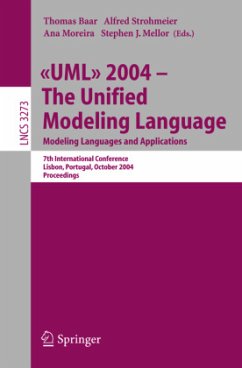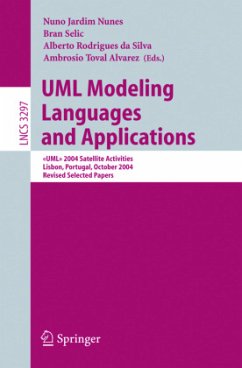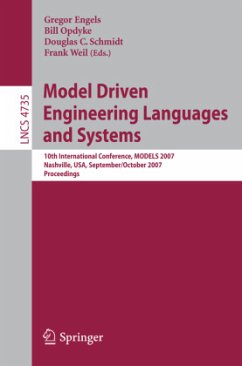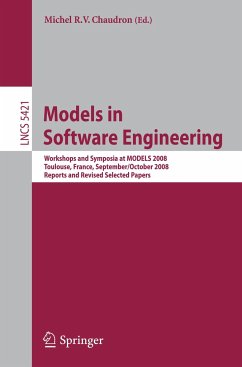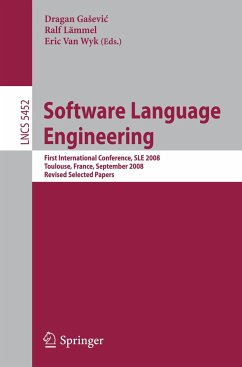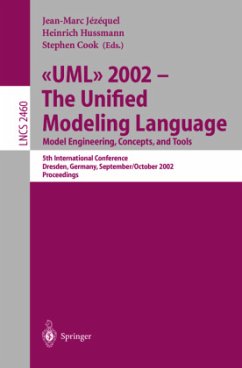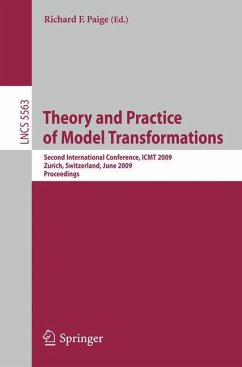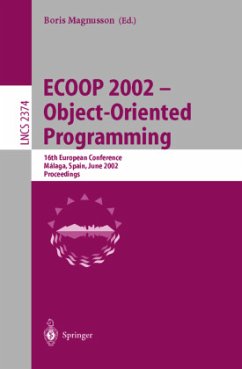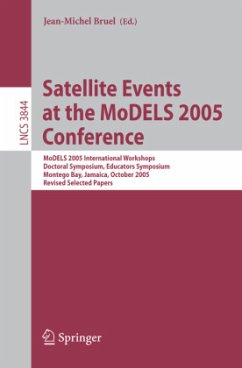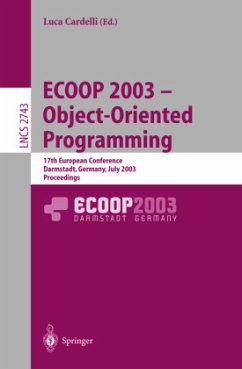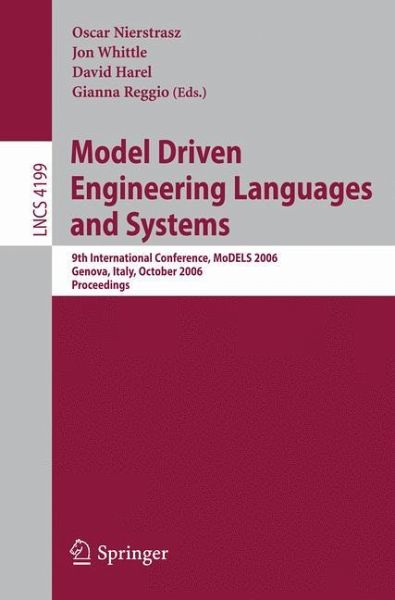
Model Driven Engineering Languages and Systems
9th International Conference, MoDELS 2006, Genova, Italy, October 1-6, 2006, Proceedings
Herausgegeben: Nierstrasz, Oscar; Whittle, Jon; Harel, David

PAYBACK Punkte
39 °P sammeln!
Keynote 1.- A Software Modeling Odyssey: Designing Evolutionary Architecture-Centric Real-Time Systems and Product Lines.- Evaluating UML.- Uses and Abuses of the Stereotype Mechanism in UML 1.x and 2.0.- An Experimental Investigation of UML Modeling Conventions.- Improving the Definition of UML.- MDA in Software Development.- Adopting Model Driven Software Development in Industry - A Case Study at Two Companies.- Use Case Driven Iterative Development: Hurdles and Solutions.- Model-Driven Development with SDL - Process, Tools, and Experiences.- Concrete Syntax.- Model-Driven Analysis and Synth...
Keynote 1.- A Software Modeling Odyssey: Designing Evolutionary Architecture-Centric Real-Time Systems and Product Lines.- Evaluating UML.- Uses and Abuses of the Stereotype Mechanism in UML 1.x and 2.0.- An Experimental Investigation of UML Modeling Conventions.- Improving the Definition of UML.- MDA in Software Development.- Adopting Model Driven Software Development in Industry - A Case Study at Two Companies.- Use Case Driven Iterative Development: Hurdles and Solutions.- Model-Driven Development with SDL - Process, Tools, and Experiences.- Concrete Syntax.- Model-Driven Analysis and Synthesis of Concrete Syntax.- Correctly Defined Concrete Syntax for Visual Modeling Languages.- Applying UML to Interaction and Coordination.- Compositional MDA.- CUP 2.0: High-Level Modeling of Context-Sensitive Interactive Applications.- Aspects.- Domain Models Are NOT Aspect Free.- A Slice of MDE with AOP: Transforming High-Level Business Rules to Aspects.- Model Intergration.- Package Merge in UML 2: Practice vs. Theory?.- Detecting and Resolving Model Inconsistencies Using Transformation Dependency Analysis.- Merging Models with the Epsilon Merging Language (EML).- Formal Semantics of UML.- Mappings, Maps and Tables: Towards Formal Semantics for Associations in UML2.- Semantic Variations Among UML StateMachines.- Facilitating the Definition of General Constraints in UML.- Security.- Towards a MOF/QVT-Based Domain Architecture for Model Driven Security.- MDA-Based Re-engineering with Object-Z.- A Model Transformation Semantics and Analysis Methodology for SecureUML.- Model Transformation Tools and Implementation.- Incremental Model Transformation for the Evolution of Model-Driven Systems.- A Plugin-Based Language to Experiment with Model Transformation.- SiTra: SimpleTransformations in Java.- Analyzing Dynamic Models.- Analysis and Visualization of Behavioral Dependencies Among Distributed Objects Based on UML Models.- Model Extraction Using Context Information.- Dynamic and Generic Manipulation of Models: From Introspection to Scripting.- Specifying Transformations.- Model Transformation by Example.- Graphical Definition of In-Place Transformations in the Eclipse Modeling Framework.- Model Transformations? Transformation Models!.- MOF.- A Mapping Language from Models to DI Diagrams.- Basic Operations over Models Containing Subset and Union Properties.- A Metamodeling Approach to Pattern Specification.- Keynote 2.- Immune System Computation and the Immunological Homunculus.- Bridging Models.- Building Abstractions in Class Models: Formal Concept Analysis in a Model-Driven Approach.- Lifting Metamodels to Ontologies: A Step to the Semantic Integration of Modeling Languages.- Incremental Model Synchronization with Triple Graph Grammars.- Risk, Trust and Dependability.- Model-Driven Assessment of Use Cases for Dependable Systems.- A Graphical Approach to Risk Identification, Motivated by Empirical Investigations.- Reusable MDA Components: A Testing-for-Trust Approach.- Tool Environments.- Using Smalltalk as a Reflective Executable Meta-language.- UML Model Interchange in Heterogeneous Tool Environments: An Analysis of Adoptions of XMI 2.- Applying Model Fragment Copy-Restore to Build an Open and Distributed MDA Environment.- OCL.- An OCL-Based Technique for Specifying and Verifying Refinement-Oriented Transformations in MDE.- An OCL Semantics Specified with QVT.- Specification of Invariability in OCL.- Roundtrip Engineering.- Framework-Specific Modeling Languages with Round-Trip Engineering.- A Visualization Framework for the Modelingand Formal Analysis of High Assurance Systems.- Layered Class Diagrams: Supporting the Design Process.- Real Time and Embedded Systems.- Using UML Activities for System-on-Chip Design and Synthesis.- Modeling and Early Performance Estimation for Network Processor Applications.- A Formal Semantics of UML-RT.- Workshops, Tutorials and Panels.- Workshops and Symposia at MoDELS 2006.- Tutorials at MoDELS 2006.-





